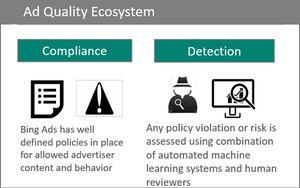Bing Rejected 250 Million Ads, Banned Thousands In 2015
- by Laurie Sullivan @lauriesullivan, May 2, 2016
 Moving to stop hackers, scammers and those who inject malicious malware into advertisements, Microsoft Bing released numbers that estimate it rejected 250 million ads,
blocked 50,000 sites and banned 150,000 advertisements from serving up in 2015.
Moving to stop hackers, scammers and those who inject malicious malware into advertisements, Microsoft Bing released numbers that estimate it rejected 250 million ads,
blocked 50,000 sites and banned 150,000 advertisements from serving up in 2015.
Misleading ads also became more of a focus for Bing last year. More than 3 million pages and 30 million ads were blocked for spam and misleading content.
More than 7,000 advertisers and 700,000 ads were blocked for selling counterfeit goods. Tech support scams were a high priority, and more than 15 million ads and 25,000 sites were blocked for third-party tech support scams.
Bing has been more lenient than Google when it comes to trademark infringement, but in 2015 the search engine reports rejecting more than 50 million ads for trademark infringement.
Phishing attacks and ads for pharmaceutical companies and counterfeit goods were at the top of the list. Bing reported that 2,000 advertisers were detected for attempting phishing attacks and it dismissed more than 800,000 million ads last year for violating Bind Ads Healthcare and Pharmacy guidelines.
Neha Garg, program manager of ad Quality at Bing, explains in a blog post that Bing improved its handling of dead links and initiated stricter checks on advertisers offering toll-free numbers.
"There have even been times our machine learning algorithms have flagged accounts that look innocent at first glance [such as] a dealer specializing in kids’ furniture -- but on close examination we find malicious intent," Garg wrote. "The backend machinery runs 24/7 and uses hundreds of attributes to look for patterns which help spot suspicious ads among billions of genuine ones."


